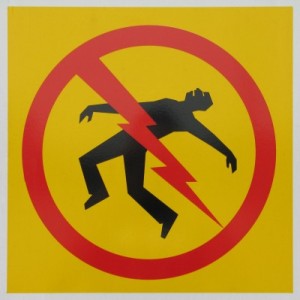 Electrical accidents on job sites cause more than 400 fatalities each year, and many of the victims are electricians and construction workers. Approximately 200 consumers also die due to electrocution through the use of electrical household products such as microwaves, hair dryers, and extension cords. In addition to these fatalities, thousands of people are injured due to defective or faulty electrical wiring that causes electric shock.
Electrical accidents on job sites cause more than 400 fatalities each year, and many of the victims are electricians and construction workers. Approximately 200 consumers also die due to electrocution through the use of electrical household products such as microwaves, hair dryers, and extension cords. In addition to these fatalities, thousands of people are injured due to defective or faulty electrical wiring that causes electric shock.
Electrocution injuries can be devastating. When electricity courses through a person’s body, the victim may be propelled to a distance or fall from a height which can result in debilitating injuries such as cuts, sprain, broken limbs, spinal cord injuries, head trauma, or even death. Electrocution itself can cause unconsciousness, cardiac arrhythmia, heart failure, loss of hearing, seizures and shock, organ damage, muscular deformity, burns that cause permanent scarring, and death. Most electrocution cases are reported to result from the negligence in maintaining electrical wiring, in enforcing safety regulations, and in using defective equipment and electrical appliances.
In some cases, an electrical utility company can be held liable for electric shock injuries, if it is found that they were negligent in their duties. Examples of negligence among electric utility companies include improper construction or installation of power lines, failure to inspect and maintain power facilities, and failure to adequately insulate live wires (especially near homes and trees).
These are some energy and power utility firms serving New Jersey:
- Public Service Electric & Gas Company (PSE&G). Considered NJ’s largest utility, PSEG serves about 2.1 million electric customers and 1.7 million gas customers across the state. It was created in 1903 as an amalgamation of more than 400 utilities companies.
- Jersey Central Power and Light (JCP&L). This firm serves 1.1 million customers in Northern, Western, and East Central NJ. Originally owned by General Public Utilities, Inc., it is now operating under FirstEnergy Corporation.
- Atlantic City Electric. With about 547,000 customers, this subsidiary of Exelon Corporation serves eight counties in Southern NJ.
Generally, workers’ compensation insurance provides compensation for monetary losses of workers injured in electrical accidents at work. However, the benefits provided by this insurance are typically insufficient to fully cover for all the damages sustained by injured workers. An experienced electrocution injury attorney can help determine if there are third parties potentially at fault in an electrical accident, and will bring a lawsuit against any third party or parties on behalf of the victim.
When consumers are electrocuted as a result of using defective or poorly designed electrical products, the consumers and their families have the right to bring forward product liability lawsuits against the manufacturers of these products. These lawsuits will make way for recovery of damages such as medical expenses, pain and suffering, loss of current and future earnings, and other electrocution-related claims.
Many people suffer from electric shock in electrical accidents because they mistakenly believe that low electricity voltage means the risk involved is low. The fact is that even electric voltage as low as 80 milliamps may cause fibrillation and can stop the heart from pumping and result in sudden death, unless effective CPR is administered or a defibrillator is applied.
Other times, innocent people are electrocuted because of live wires. These high voltage wires don’t just fall down from the sky, although they have killed many people on the streets due to the negligence of some people or entities. In such as case, a personal injury claim can be filed against the negligent entities.
Free Consultation
If you suffered injuries or if your loved one suffered wrongful death due to electrocution anywhere in New Jersey, you may contact The Grossman Law Firm today at (732) 943-0383 for a free consultation and be represented by a competent personal injury attorney on a contingency fee basis. Our fees are based on a percentage of the recovery from settlement or verdict of your case.
